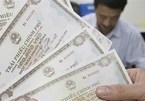At the working session of the National Assembly Steering Committee which discussed the amendment of the Securities Law, one of the hottest topics for discussion was the tentative regulation on the issuance of bonds by non-public companies.

National Assembly’s Chairwoman Nguyen Thi Kim Ngan said she was worried when the draft law said real estate firms can make private offerings.
“I many times have put forward the issue at important conferences. How to control this, and who will control the issuance?” Ngan said.
Tran Dang Kham from the Finance & Banking Institute belonging to the Hanoi Economics University said Ngan has reason to worry, because international bonds are counted as national debts.
As such, when real estate firms issues international bonds, Vietnam’s foreign debts will increase. Vietnam’s foreign debts have nearly hit the ceiling.
| If Vietnam’s debts increase, its credit rating will decrease. If so, it will be more difficult for Vietnam to borrow money from foreign sources, or it will have to pay higher interest rates. This will create general losses to all Vietnamese businesses as well as the entire economy. |
"One must calculate the ability of the nation to pay debts based on GDP growth and domestic debts and determine the national debt limit,” he said.
In other countries, the national debt is up to 200 percent of GDP or even higher. But if their GDP grows well, they will still be able to pay debts.
If Vietnam’s debts increase, its credit rating will decrease. If so, it will be more difficult for Vietnam to borrow money from foreign sources, or it will have to pay higher interest rates. This will create general losses to all Vietnamese businesses as well as the entire economy.
Meanwhile, an analyst noted that real estate is a risky sector, therefore, the bonds to be issued by real estate firms would have high risks. If the issuers cannot pay debts, this will damage prestige and lower Vietnam’s credit rating.
If businesses in general and real estate firms expand the issuance of international bonds, this would cause higher risks for Vietnam’s financial system.
According to Kham, there is no need to worry about the lack of transparency in information when businesses make private placements.
In principle, when businesses issue bonds to the public, they must expose all information. However, many small individual investors cannot access the information.
When making non-public offerings, investors have the responsibility of learning about information and have to incur risks. Issuers have the responsibility of providing sufficient information to these institutional investors.
Also according to Kham, when businesses make private offerings in the international market, Vietnamese investors will not have the opportunity to buy the securities. The bond issuance under this mode also has low liquidity, while the interest rates that issuers have to pay will be higher. A'the issuance relates to the forex management policy.
Kim Chi

Anonymous foreign investor buys entire batch of Phu My Hung bonds
Phu My Hung Development Corporation has mobilised VND800 billion ($34.78 million) for real estate projects from a "secret" foreign investor through bond sales.

Vietnam’s bond market continues growth
Vietnam’s local currency bond market grew 2.6 percent to 52.9 billion USD in the second quarter of this year, after a 0.7 percent expansion in the first quarter.
 Whether to allow real estate firms to issue bonds in the international market remains a controversial issue.
Whether to allow real estate firms to issue bonds in the international market remains a controversial issue.